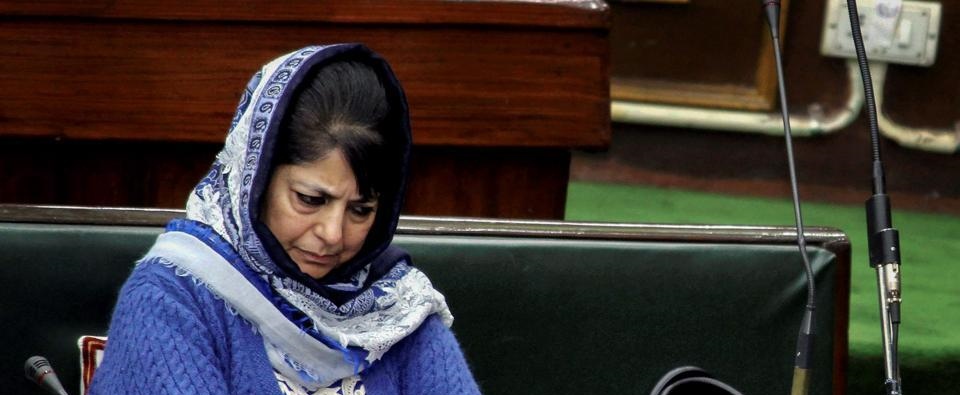J&K CM Mehbooba Mufti Resigns
June 19, 2018 | Expert Insights

Bharatiya Janatha Party (BJP) has decided to sever the alliance with the People’s Democratic Party (PDP) in the State Assembly of Jammu & Kashmir (J&K).
Chief Minister Mehboob Mufti has since submitted her resignation to Governor NN Vohra.
Background
Jammu and Kashmir is the northernmost state of India bordered by China, Pakistan and Afghanistan. The Himalayas divide the Kashmir Valley from Ladakh while the Pir Panjal range, which encloses the valley from the West and the South, separates it from the Great Plains of northern India. Natural mountain barriers have created biospheres unique to the state, such as the cold deserts of Ladakh.
Kashmir’s economy is based around agriculture owing to suitable soil and temperature conditions. Kashmiri wool, archaically known as “Cashmere,” is world renowned. The Indian-administered portion of Kashmir is believed to have potentially rich rocks containing hydrocarbon reserves.
In 1819, the Kashmir Valley passed from the control of the Durrani Empire of Afghanistan to the conquering armies of the Sikhs under Ranjit Singh of the Punjab, thus ending four centuries of Muslim rule. Hari Singh was the Hindu ruler of the Princely State of Kashmir in 1947 who chose independence from India and Pakistan. However, Pashtun tribesmen and Pakistani forces launched a guerrilla war which led to Maharaja Singh signing the Instrument of Accession, thereby allowing Indian armed forces to defend the state.
India has sought resolution of the conflict at the UN, but the territory is now administered by India, Pakistan and China following wars in 1962, 1965 and 1971. A disputed election in 1987 became the stimulus which led to the rise of many of the modern insurgent groups. Opposing factions have pledged allegiance to either India, Pakistan or the movement for an independent sovereign state. India has claimed that Pakistan aids the insurgency, but the latter has denied those charges.
Article 370 of the Indian Constitution provides for separative governance of the Kashmir Valley, while the Armed Forces (Jammu and Kashmir) Special Powers Act of 1990 (AFSPA) grants special powers to the armed forces in the “disturbed area.” Jammu & Kashmir is governed by a unique constitution, separate from the one applicable on the Union of India.
Violence in the valley increased after the death of Burhan Wani, a rich young Muslim who joined the Hizbul Mujahideen, in 2016. Nearly 50,000 protestors took to the streets in the Shopian district, with some throwing rocks, and were met with metal pellet firing by the Indian armed forces resulting in multiple deaths and injuries. Reparations for the injured have been dismal as many are yet to receive compensation.
The United Nations released the first ever report on human rights violations in Kashmir, asserting that the Indian armed forces have used excessive force in Kashmir with many civilians killed and wounded since 2016. The report, released on 14th June, details human rights violations on both sides of the Line of Control, urging Pakistan to end its “misuse” of anti-terror legislation to persecute peaceful activists and quash dissent.
Analysis
The Bharatiya Janatha Party’s (BJP) move to pull out of the coalition in Jammu & Kashmir was followed by Chief Minister Mehboob Mufti submitting her resignation to Governor NN Vohra. She has called for an emergency meeting of the People’s Democratic Party (PDP). In the 89-member State Assembly, BJP holds 25 seats while the PDP maintains 28. As the Congress has only 12 seats, there is no possibility for an alliance to reach the majority mark. However, the National Conference, far from an ally of the PDP, has 15 seats.
CM Mufti had earlier initiated a ceasefire on anti-terror operations for the month of Ramazan. "We brought in unilateral ceasefire which brought a lot of relief to the people. We can't have a muscular policy in Jammu and Kashmir,” said Mufti.
"Our agenda was healing touch, we can't treat Jammu and Kashmir as enemy territory," she told reporters.
Isolation of Jammu & Kashmir from the Union of India was observed by many within the PDP. Fault-lines shook the “disturbed” region after the rape of an 8-year-old girl from a minority community in Kashmir. Party members from the BJP were seen joining a rally in support of the accused in a distasteful move.
Instances of sexual violence, torture, arbitrary detention, forced disappearances and so on was detailed in the recent UN report on Human Rights Violations. The BJP led NDA alliance at the Centre dismissed the report as “fallacious.” Experts pointed out that the report was in breach of the mandate for the High Commissioner for Human Rights provided in the UNGA Resolution 48/141 as it violated India’s sovereignty and territorial integrity by acknowledging Pakistan’s illegal occupation and administration of Gilgit Baltistan and Azad Jammu & Kashmir. Both areas are not recognised as sovereign by the state of India.
"It had become untenable to continue with the PDP government in Kashmir," said senior BJP leader Ram Madhav.
Assessment
Our assessment is that the two parties have recently been drifting apart and blaming each other for the massive mob-violence and the rising militancy in Kashmir.








Comments